09 Sep 14 | Namibia, News and features, Politics and Society
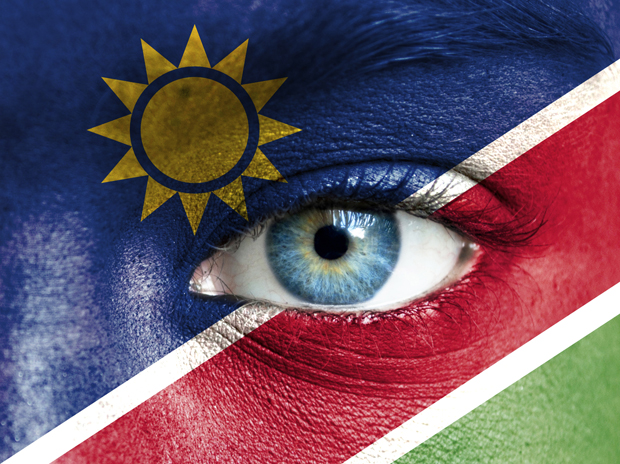
(Image: Aleksandar Mijatovic/Shutterstock)
Controversy surrounded the Namibian parliament’s recent decision to make 40 amendments to the country’s constitution without consulting civil society or the wider public. The dispute resulted in a journalists being verbally and physically attacked live on air by a government party councillor.
The Namibian Constitution Third Amendment Bill was passed on 27 August, and provides for an enlarged parliament and a vice president, an increase in the number of president’s appointees to legislature from six to eight and making the primer minister an optional role, among other things. But critics believe the bill was rushed through by the ruling party Swapo, to accommodate its old guard who are at risk of being edged out of the national council due to the implementation of 50/50 gender representation. The changes were put in place ahead of the general election, set to take place on 29 November.
After revelations by the media that proposed amendments were going to be pushed through parliament, civil society groups rallied to form a “My Constitution, My Decision” group which called for widespread public consultations on the changes. Supported by the Southern African Development Community Council of Non-Governmental Organisations (SADC-CNGO), the group called for the withdrawal of the bill.
“The bill, which proposes 40 changes to the constitution, has far-reaching consequences for the configuration of the Namibian legislature and the lives of the citizens at large” said Secretary General Boichoko Ditlhake ahead of the passing of the legislation. He added that “to rob citizens and civil society of the space for participation… is to rob them of their determination to defend their constitution”.
Namibian prime minister, Hage Geingob, Swapo’s candidate for the presidency in national elections, dismissed the concerns of media and civil society groups. He accused some individuals of being “failed politicians”, that they risked jeopardising the peace, and claimed that Swapo had the mandate to make the changes without consultations with the people. Geingob also condemned opposition parties claiming they hadn’t been consulted either, saying there had indeed been meetings to ask them what they thought.
Feelings ran high as Geingob, supported by the head of Namibia’s Law Reform Development Commission (LRDC), Sacky Shanghala, defended the controversial amendments. He argued, among other things, that an enlarged parliament of 104, compared to the previous 72, would make for more effective governance.
As the prime minister planned to address a hastily-convened public meeting in Windhoek’s Katutura township on the changes, a Swapo councillor, Ambrosius Kandjii, barged into the studios of the Namibia Broadcasting Corporation (NBC) on August 13. Kandjii verbally and physically attacked a producer, who was live on air, accusing her of being a “liar” and supporting the opposition Rally for Democracy and Progress (RDP). He also insisted the radio station belonged to Swapo and not to the public.
The producer in question is reportedly too afraid to take the matter further and is said to be worried about her safety and that of her children. The Media Institute of Southern Africa (MISA) issued a statement calling for an investigation into the incident by the NBC Director General as well as to ban the councillor from entering the studios again. They also asked Namibian President Hifikepunye Pohamba, to hold Kandjii accountable and condemn the action. There is currently no indication that the authorities have responded to these calls.
The hardline attitude of Geingob, the man widely belived to be Namibia’s president-in-waiting, comes in contrast to his earlier stance of being more accommodating of civil society. In his doctoral thesis, published recently, he said “One thing is sure, if attempts are made by influential persons to undermine the constitution, backed by the ruling party having two-thirds majority in the National Assembly, the constitution can be wrecked,” adding that the survival of the constitution in part depends “on the evolution of society and social groups, and, in turn, civil society”.
This article was posted on 9 Sept 2014 at indexoncensorship.org
09 Sep 14 | Bahrain, News and features, Politics and Society, United Kingdom
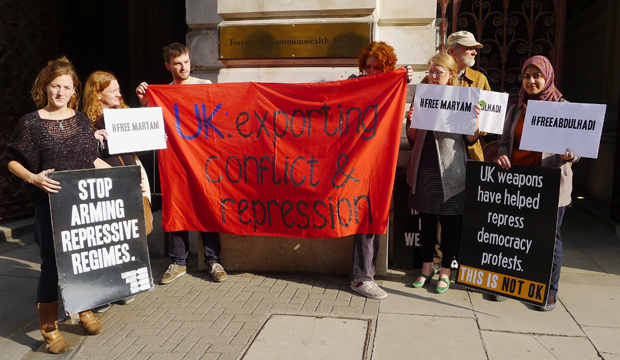
Protest for the release of Bahraini human rights activists at the British Foreign and Commonwealth Office
Today a protest was held outside the Foreign and Commonwealth Office calling for the UK government to condemn the regime in Bahrain and support the release of human rights campaigner Maryam Alkhawaja and her father, Abdulhadi Alkhawaja, who has been in prison in the country since 2011.
The UK has had a close relationship with Bahrain’s government, supplying them with weapons in the past. The British government has failed to speak about human rights violations in the country. The protest was aimed at foreign office staff on their way to work to raise awareness of the issue and spark internal debate.
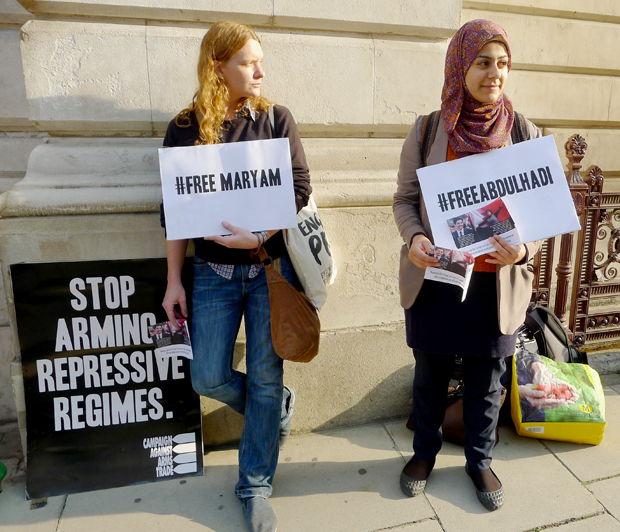
Maryam Alkhawaja was detained in Bahrain at the end of last month when she travelled to the country to visit her father, a Bahraini human rights campaigner and co-founder of the Bahrain Centre for Human Rights (BCHR), which won the 2012 Index Freedom of Expression Award for Advocacy; he is serving a life sentence for terrorism offences and began a hunger strike two weeks ago.
Sign the Free Maryam petition here
This article was posted on 9 Sept 2014 at indexoncensorship.org
09 Sep 14 | Magazine, Volume 43.03 Autumn 2014
[vc_row][vc_column width=”1/2″][vc_single_image image=”90659″ img_size=”full” onclick=”custom_link” link=”https://shop.exacteditions.com/gb/index-on-censorship”][/vc_column][vc_column width=”1/2″][vc_column_text]
Subscribe to Index on Censorship magazine on your Apple, Android or desktop device for just £17.99 a year. You’ll get access to the latest thought-provoking and award-winning issues of the magazine PLUS ten years of archived issues, including Seeing the future of journalism.
Subscribe now.
[/vc_column_text][/vc_column][/vc_row]
08 Sep 14 | About Index, Campaigns, Statements
The Independent Press Standards Organisation (Ipso) does not yet meet all the requirements for an effective, voluntary self-regulator. But we should not let flaws in its current design be used as an excuse to turn to state regulation of the press – or to introduce a system that effectively makes press regulation compulsory, and which punishes the poorest.
Index on Censorship welcomes the establishment of the new press regulator Ipso, but calls for further work to be done to ensure it is both clearly accountable and genuinely independent in providing an effective means of dispute resolution. As we said in our submission to the Leveson Inquiry in 2012, the range of inappropriate, unethical and illegal behaviour by some journalists and media organisations that the inquiry exposed demonstrated a clear need for “a better and tougher approach to press regulation” and that a new and more effective approach to self-regulation of the press was vital if statutory regulation was to be avoided.
Index does not support the Royal Charter, an ill-conceived political fudge that indicates the beginnings of creeping state interference in an industry that must remain entirely free of political and governmental involvement, and does not believe that any regulator should seek recognition under the Royal Charter.
As we wrote in 2012: “A new regulatory body, set up on a self-regulating basis, must push for a high standard of corporate governance and accountability. And it must have a wide-ranging remit to monitor and address issues of journalistic standards including ethical standards. It must offer a straightforward, effective and fair approach for dealing with individual complaints [and]… must be able both to defend privacy and to be clear about where, when and why a public interest defence can override privacy.”
Though we believe the new regulator goes some of the way to meeting these demands, it is of concern that despite the length of time Ipso has had to consider the matter, the regulator launched today offers no effective means for swift, low-cost dispute resolution and complaint handling. Rapid, cheap arbitration will be a key element for any successful press regulator and comments from Sir Alan Moses this morning indicate that Ipso is still a long way from a decision on how such a scheme should be run. Ipso must institute an easy, fast and fair way of resolving defamation claims and other disputes as a matter of urgency.
We are also worried about the level of genuine accountability of the new regulator, and the potential for the wealthiest news organisations to exert undue influence over the workings of Ipso through its current funding mechanism, not least through a current proposed veto that the funding body would have over any changes to the regulator’s code of conduct. Sir Alan Moses will need to ensure there is clear separation between the workings of the regulator and the newspaper members that fund it. He will also have to do more to demonstrate how Ipso will be publicly accountable.
There is a risk that without a clear indication of how the independence and efficacy of Ipso’s work will be assessed and verified, other proposed press regulators may seek to gain public trust by seeking recognition under the Royal Charter. This could unleash exemplary damages and costs for Ipso members and any other publishers, including potentially individual bloggers and small websites, who choose – for whatever reason – not to be part of a recognised regulator. Such actions would undermine the very notion of a voluntary system of regulation, and therefore of a free press.
08 Sep 14 | Iran, Middle East and North Africa, News and features, Religion and Culture
I’m a hand that has become a fist…
I’m a Shia in Bahrain, I’m an Armenian in WWI
I’m the one who is starving, with ribs obvious from starvation
They are raping someone and I am the sound of the agonised screaming
When they tell him or her “relax, so that we can enjoy it, whore”, I’m that tense muscle
I’m an Afghan homosexual woman that lives in Iran
Iranian rapper Soroush Lashkari, aka Hichkas, is sharing extracts from an unfinished song for his new album Mojaz, translating the lyrics into English on the spot. Hichkas (Nobody) has been called the godfather of Iranian hip-hop, which seems fitting for a man who turned the local calling code for Tehran — 021 — into song and a sign language that became the symbol of the Iranian hip-hop movement and its followers. But being a hip-hop artist in a country where the genre is banned comes with many challenges.
“When we made physical copies of our first album Jangale Asphalt in 2006, we were arrested whilst selling it on the streets of Tehran,” Hichkas, now in his late twenties, tells Index on Censorship. “You can’t just sell records in Iran, you need to seek approval from the authorities before you release anything or perform concerts. There is no structure or support system for musicians to perform freely, and in particular for hip hop artists.”
Anyone who wishes to publish, distribute or perform music in Iran is required to submit their work for review by the Ministry of Culture and Islamic Guidance (MCIG), which is guided by Islamic law in force since the country’s 1979 revolution. The MCIG operates under the influence of the minister of culture, who is chosen by the president and the parliament. Even if the amount of freedom artists may experience varies under each presidency, all recordings submitted are archived to ensure the authenticity of Iranian musical culture is maintained. Exposure to Western music is also heavily scrutinised with genres such as hip-hop banned altogether. The implication is that musicians adopting traditional Iranian standards are favoured over artists incorporating external sounds tainted with “decadence”. The name of Hichkas’ upcoming album Mojaz -– meaning an album or artwork within the mojavez, the seal of approval required from the MCIG to sell records in the country.
The advent of the internet has provided an opportunity for musicians to challenge official censorship. The MCIG measures, designed with the intention to control the relationship between musician and audience within Iran’s geographical borders, often lead to long waits for recordings to be released. Digital technologies allow artists to distribute music produced in home-based studios or in secret locations, bypassing official channels. The web had a particular effect on Iranian hip-hop, helping rappers facilitate their own version of concerts through mobile phone video uploads and live streaming.
A figurehead in developing these alternative systems of dissemination, Hichkas argues the intention was not to go against the revolutionary regime as part of a political act. “Even if the laws allowed rappers to release music freely, consumers of music around the world were already shifting towards buying internet downloads,” he says. “In other words, the crisis of selling music was not unique to Iran; the real problem back home is that there is no way of making money from shows with rappers not being allowed to perform.”
But having been arrested numerous times for his work, it’s clear that even if you claim to shun politics, everything becomes political under a paranoid regime. “I’m actually a quiet person,” he said.
Hichkas doesn’t replicate American accents and maintains his typically Iranian appearance, blending in with those on the street. Most importantly, he embraces literary devices rooted in traditional Iranian poetry and turns it into conversational street talk that engages the disillusioned.
“I don’t like the blinging culture of hip-hop made in America that celebrates money and fakeness,” he said. “Me and my friends were teenagers making music that described our own culture, the society we grew up in, and challenging the clichés associated with it.”
He argues that the absence of hip-hop from the Iranian music scene is due to the lack of artists adopting the genre, rather than the association of hip-hop as a Western import. “No one had adopted rap to make music about our culture before us, so it was inevitable to be the first in finding that path for hip-hop to be heard,” he says. “We set standards through being driven by the love of what we were doing, which forced authorities to catch up and think about how investments can be made into a growing movement.”
Being a pioneer in developing a distribution network meant Hichkas’ many supporters outside of Iran began facilitating performances for him abroad in 2011, helping him get visas and opportunities to lecture at leading universities. Now based in London and juggling studio time alongside college work, he hopes his work on Mojaz “will add more substance to the poetry” and “set new benchmarks musically within the global standards of hip-hop by making it experimental but at the same time catchy”.
While he admits that rapping in Farsi is “a big barrier” to international audiences, he hopes the inclusion of English subtitles will help listeners find common ground across cultures. “Although previous songs were written in Iran and made in Iran, my lyrics were against evil deeds all around the world,” he explains. “They were against human discrimination in general. I want to continue writing something that engages my audience back home by addressing issues I have always talked about. I will use different lyrics, matching together social problems worldwide to scenes and characters that they can relate to.”
He says being in London, and having the opportunity to meet people from all over the world “helps me think about humanity through discovering common viewpoints.” The relocation also means working out new processes of distribution, from the logistics of sharing music from outside Iran, to the adoption of technological developments such as the bitcoin.
Navigating the external restrictions in his work has in itself become an art in the development of hip-hop. Working alongside long-time producer Maghdyar Aghajani, Hichkas preserves Iranian roots in his work whilst ensuring he can make his mark on the world wide hip-hop scene by making “a more complex music rather than the typical hip-hop” in his upcoming album.
“Self-censorship actually helps you to have more impact,” Hichkas argues. “Regardless of what the authorities say, if you come out in an extremely raw way in a closed society, people are not going to understand you. Also, if someone can’t go back to his or her society, how is he or she able to see what’s going on internally in his or her country? Why say something if you end up in jail for three years?”
He has tried writing about who he would be if he didn’t live under these rules, but gave up. “It just didn’t work,” he explains, “the lyrics wouldn’t flow, simply because I felt I would still be the same person, pushing boundaries through talking about whatever is going on around me from the culture I come from.” He says he wants to study psychology, “to understand how these cultures shape people, including those who choose to go into government.”
“Therefore, my music is not aimed at changing politics, but changing something at a grassroots level.”
This article was posted on 8 Sept 2014 at indexoncensorship.org
08 Sep 14 | Magazine, News and features

We want to offer free access to Index on Censorship magazine’s ipad or iphone app from a symbolic place that represents freedom or censorship anywhere around the world – and we are calling on you to nominate your choice.
Suggest a symbolic place for censorship or freedom – from Speakers’ Corner in London to Egypt’s Tahrir Square – and if we opt for your suggestion, we will unlock the app so readers standing on that spot will get free access for one year.
Download the free taster app today here
What you need to do:
1) Pick a global location that’s associated with free speech or censorship
2) Tweet your nominated location to @Index_Magazine using hashtag #FREESPEECH before 30 September 2014. Follow @Index_Magazine if you are not already a follower.
3) Selected locations announced on 22 October 2014, with free access to Index on Censorship Magazine app immediately available for one year
* Winning locations picked by Index on Censorship magazine team
** Free app access available at winning locations until 1st September 2015
*** Information on the Index on Censorship magazine app here
05 Sep 14 | Azerbaijan, Azerbaijan News, News and features
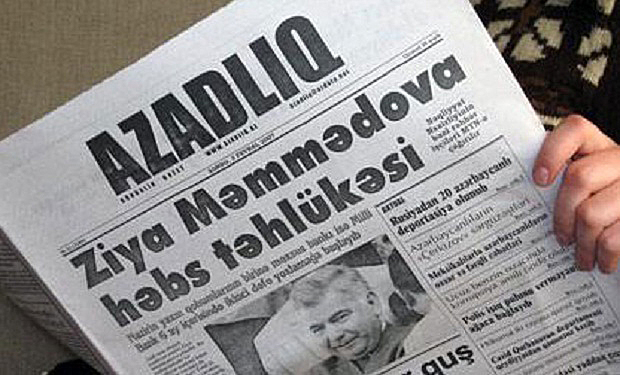
Seymur Hezi, a reporter working for Azadliq, Azerbaijan’s last independent newspaper, was sentenced to a two month pretrial detention on Monday, charged with disorderly conduct. This morning, journalist Khadija Ismayilova was detained at the Baku airport, according to the Institute for Reporters’ Freedom and Safety (IRFS).
Hezi’s arrest is another sign of the continuing clampdown by Azerbaijan’s authoritarian government on civil society. The journalist was charged with an alleged attack on a person in the street, although his lawyers claim he was trying to protect himself after he had been harassed and attacked.
It is not the first time charges of hooliganism and disorderly conduct have been applied against opposition politicians, civil society activists and journalists in Azerbaijan. In previous years, the same charges were used to imprison critical journalists Sardar Alibeili and Ganimat Zahid as well as bloggers Emin Milli and Adnan Hajizadeh.
“Seymur Hezi’s arrest is a serious blow against our newspaper. He is one of the brightest Azerbaijani analysts and journalists, and a true intellectual,” Rahim Haciyev, acting editor of Azadliq newspaper, told Index.
Haciyev said he is sure Hezi’s arrest is the result of a planned provocation and the journalist is prosecuted for publishing critical articles on the authorities in the newspaper, as well as in his online TV program “Azerbaijani Hour”, which he scripts and hosts.
The journalist’s arrest came only a month after the newspaper he works for, Azadliq, was forced into suspension of publication due to financial pressure from the authorities. Now it exists only in its online version.
The authorities of Azerbaijan continue their clampdown on the civil society of the country. Well-know human rights defenders Rasul Jafarov, Intigam Aliyev, Leyla Yunus and her husband Arif Yunus are still behind bars after they were all sentenced to 3 months of pretrial detention. The office of the Institute for Reporters’ Freedom and Safety (IRFS) was searched and sealed.
This wave of repression is connected to new legislation in place in Azerbaijan that restricts the freedom of association. In fact the new law makes it illegal for unregistered civil society organisations to receive funds for their activities.
This article was posted on 5 Sept 2014 at indexoncensorship.org
04 Sep 14 | Digital Freedom, Iran, News and features
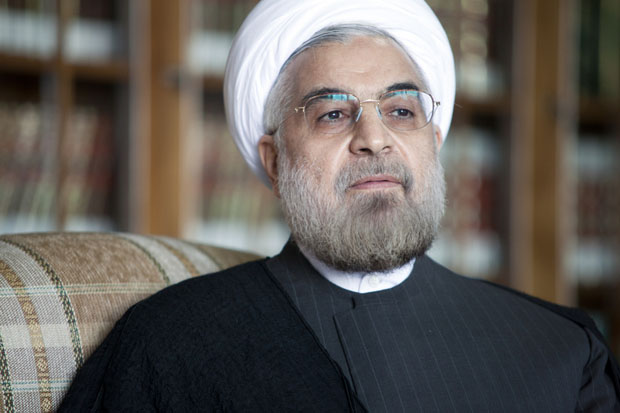
(Image: Meysam Mim/Demotix)
President Hassan Rouhani is fond of rhetorical flourishes that promise Iranians freer access to virtually all forms of information, from satellite television to uncensored books to a less tightly-regulated press. While in all of the aforementioned areas his policies have failed, or failed to exert themselves, there is one domain where the Rouhani government has pushed forward seriously: securing Iranians better and faster internet connections, including mobile internet that would enable them to properly use the smartphones they buy with such enthusiasm.
In remarks to a group of clerics on Monday, Rouhani presented the internet as crucial to the nation’s progress in both science and academic research, areas that Supreme Leader Ali Khamenei has also identified as paramount to Iran’s development. “We cannot cannot close the gates of the world to our younger generation,” Rouhani said.
He warned that if Iran refuses to tolerate the technological needs of a savvy young generation now, “we will have to do it tomorrow. If not, the day after tomorrow.”
Though Rouhani has backtracked on a number of cultural reforms in the face of fierce hardline opposition, he has been steadfast in backing his internet ideals with hard policies. In the past two weeks, the government has granted 3G and 4G licenses to the country’s two main mobile operators, and has in recent months also permitted internet providers to increase bandwidth on home connections.
One reason why the president has been more willing to back the provision of higher speed internet is that so far, it has come at a more reasonable political price. Because service providers still implement government filters, the state censorship regime that prevents Iranians from accessing websites deemed “immoral” — everything from Facebook to many Persian news sites — will remain in place. While faster connections do mean that Iranians can more nimbly use proxy servers to get around the state filters, the speeds are still slow by developed world standards, requiring great patience from those wishing to use the internet to its full capacity. But 3G and mobile internet remain issues highly contested by hardliners made nervous by the challenges of filtering mobile devices.
Grand Ayatollah Nasser Makaram Shirazi last week issued a fatwa declaring high-speed and mobile internet haram, later comparing mobile internet to “muddy water” that requires filtering. Rouhani has sought to bypass these concerns by making the case for the internet’s importance as a research tool for scientific progress. As Rouhani joked in an 30 August press conference, the speeds that the country’s clerics are advocating are slow enough to make someone waiting to download an article fall asleep.
This framing of the issue is a canny approach, for it challenge Khamenei to back up his ardent support for Iranian scientific empowerment with policies that might otherwise make him uncomfortable. This past July at a meeting with university professors, Khamenei praised the work of the country’s “scientific movement”, saying that it “has achieved great objectives and become recognised on the international scene”.
By linking the objectives most dear to Khamenei to his own objective of pulling Iran out of the internet dark age, Rouhani is carving out a political space where his goals are seen to overlap with those of the supreme leader.
When the Committee for Determining Criminal Web Content sought to block access to the popular mobile messaging tool WhatsApp, Rouhani intervened. While this certainly endeared him to young Iranians who used the messaging service widely, Rouhani also risked riling the National Telecommunications Company, which is losing revenue as Iranians turn to cheaper foreign alternatives for messaging.
In the battle over control of the internet, there are multiple institutions across political factions vying for a role, with the competing financial interests of various mobile, 3G and telecoms providers underlaying the fray. But what’s clear is that Rouhani has chosen the internet as one of the rare areas where he will back rhetoric with clear policy.
This article was published on 4 Sept, 2014 at indexoncensorship.org
04 Sep 14 | News and features, Nigeria, United Kingdom
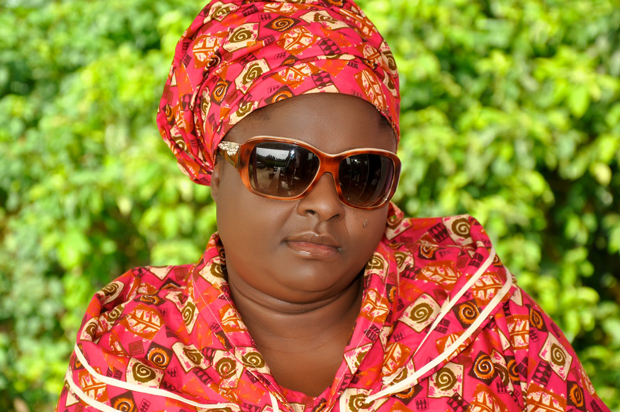
Lady Apostle Helen Ukpabio was banned from travel to the UK in April 2014
Lady Apostle Helen Ukpabio is a pastor, author, film producer, actress, artist, composer and singer and founder of Liberty Foundation Gospel Ministries, based in Calabar, Nigeria. She is also, as one would suspect of someone with such a CV, possessed of admirable chutzpah.
It emerged this week that Ukpabio is threatening to sue the British Humanist Association to the tune of half a billion pounds (to be precise, £500,010,500 in costs and compensation). Ukpabio claims that the BHA, and their companions at the Witchcraft and Human Rights Information Network, have defamed her. Her specific claim against the BHA is that an article on its website claimed she believed that noisy babies may be possessed by Satan.
The article, which appeared in July 2009, says that Ukpabio wrote in her book, Unveiling The Mysteries Of Witchcraft, that “A child under two years of age that cries at night and deteriorates in health is an agent of Satan”.
In this, the article is mistaken. Ukpabio’s book does not seem to contain this sentence. Rather, under the heading “How To Recognise A Witch”, Ukpabio writes: “Under the age of two, the child screams at night, cries, is always feverish suddenly deteriorates in health, puts up an attitude of fear, and may not feed very well.”
This is not, you will see, the same. But a misquote is one thing; a libel is quite another.
The placing of this misquote at the centre of Ukpabio’s claim is based on the premise that it is fundamentally worse to accuse a child of being possessed by a devil than it is to accuse a child of being a witch, or possessed by a witch, or a vampire (as mentioned in the initial legal threat).
This is the stuff of a particularly heated thread on a Dungeons and Dragons board. It is not an argument that has a place in a chamber at the Royal Courts of Justice, in spite of that building’s Gormenghastish architecture.
That’s not the only reason the case shouldn’t come to court: the article in question was published over five years ago, apparently without ill effect on the lady Ukpabio. She admits to not having seen the article on the BHA website until earlier this year.
Her complaint, in reality, is not about the 2009 article, or the difference between satanic possession and witchcraft. Ukpabio’s underlying complaint is about a campaign to have her banned from the country in April 2014. It is the coverage of her controversial trip to Britain in April that her lawyer claims caused her to suffer reputational injury.
So why, rather than attack the numerous news outlets who reported negatively on her UK visit, during which a London venue cancelled her booking after being alerted to her witchfinding and exorcising activities, is she instead pursuing threatening humanists?
At the World Humanist Congress in Oxford last month, Nigerian delegates such as the brilliant, brave Leo Igwe, spoke passionately about preachers and witchfinders like the Lady Apostle. While in Britain “militant atheist” has become a term of abuse associated with the gauche tweets of Professor Richard Dawkins, in Nigeria, a forthright approach to religion and the abuses carried out in its name is a necessity. Humanists there are not fighting semantic battles; rather, they are engaged in a real struggle to save children and vulnerable people from accusations of witchcraft and possession: accusations that could lead to them being thrown out of their homes, beaten and even killed.
What scant support Nigerian activists receive comes from the international atheist and humanist community. While I would not cast doubt on western humanists’ solidarity with their Nigerian comrades, a costly court case would make anyone think twice before getting involved in faraway struggles again.
To grant Ukpabio’s claim any credence would be to severely inhibit the struggle against dangerous superstitions in Nigeria and elsewhere in Africa. To even get involved in an legal argument over whether satanic possession is worse than witchcraft would grant a glimmer of legitimacy to the abuse of children in the name of God. That is reason enough for the English High Court to dismiss the Lady Apostle’s ludicrous lawsuit.
This article was posted on Sept 4, 2014 at indexoncensorship.org
04 Sep 14 | ArtFreedomWales, Events, News and features
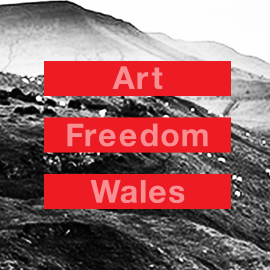 Is the space for artistic freedom of expression expanding or shrinking?
Is the space for artistic freedom of expression expanding or shrinking?
ArtFreedomWales is part of Index on Censorship’s programme taking stock of the support for artistic expression across the arts sector in the UK and ArtFreedomWales focuses on the specific issues impacting on Welsh arts and culture.
Join artists from all fields and working at all levels in Wales for an afternoon of participatory debate and open, honest discussion.
Confirmed speakers include:
- Elen ap Roberts (Artistic Director, Pontio Centre of Arts and Innovation)
- Dai Smith (Chair of Arts Council Wales)
- Baroness Kay Andrews (Author of Tackling Poverty through Culture)
- Lleucu Siencyn (CEO Literature Wales)
- David Anderson (Director General of Museums Wales)
- John McGrath (Artistic Director, National Theatre Wales)
WHEN: Thursday 27th November, 1pm – 6pm
WHERE: Chapter Arts Centre – Cardiff (Map/directions)
TICKETS: £5 contribution to costs, available from Chapter Arts Centre Box Office.
#ArtFreedomWales
ArtFreedomWales: Google Hangouts With Artists From Across Wales
In the lead up to this event, we’re hosting online discussions with artists from across Wales. The first, asking whether Wales is a centre for artistic free expression featured Tim Price, Lisa Jen, Kathryn Gray and Leah Crossley. Watch it here.
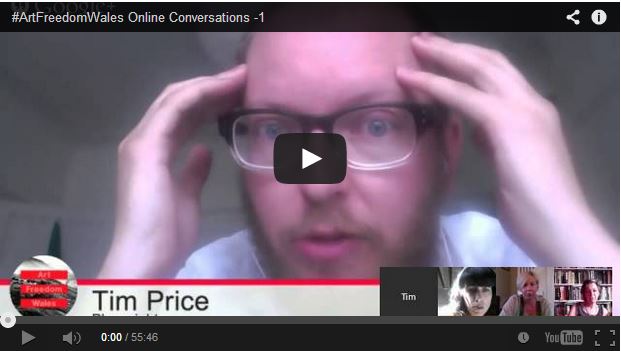
The second, exploring the situation for artists working in Welsh featured Bethan Jones Parry, Arwel Gruffydd, Bethan Marlow, Mari Emlyn and Iwan Williams. Watch it here.
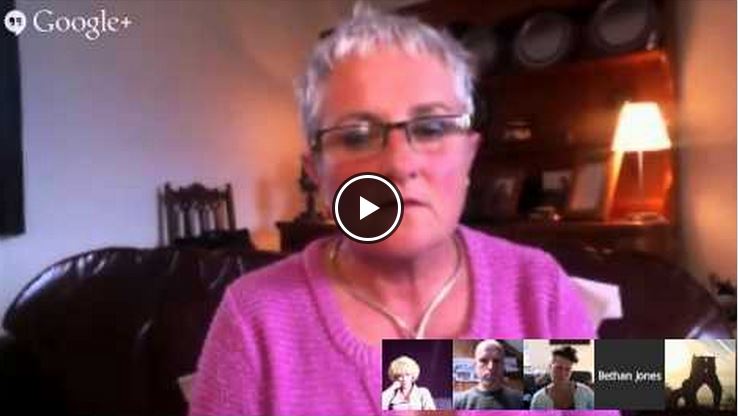
Two further discussions will follow in late September and early October – check back here for details. Collectively, these discussions will inform the agenda for the #ArtFreedomWales symposium.
ArtFreedomWales: Why We Are Doing This.
“Freedom of expression is not self-perpetuating, but needs to be maintained by the constant vigilance of those who care about it.” Michael Scammell – Index on Censorship Magazine 1972
We believe that freedom of artistic expression lies at the heart of artistic practice. Support for artistic freedom allows the artist to push boundaries, to say what is not being said, to imagine the world differently, to act as critic and to speak truth to power. Artistic freedom of expression thrives on risk and experimentation, embracing controversy and diversity of opinion. And there is a vibrant and essential debate triggered by challenging art.
You only have to think of what happens to artists in societies that are not free… But even in countries where freedoms are upheld as a core principle, artistic freedoms are all too easily eroded by social, political and sometimes legal constraints.
ArtFreedom: The UK Programme so far.
In 2013 we held a conference in London ‘Taking the Offensive’ hosted by Jude Kelly at the Southbank Centre to identify and explore the social, political and legal controls that shape our cultural landscape. Nicholas Serota gave an insightful keynote speech and amongst the contributors were lawyer Anthony Julius, Professor Mona Sidiqui, Sir Hugh Orde (President of the Association of Chief Police Officers), Sally Tallant (CEO Liverpool Biennial) and Moira Sinclair (Executive Director of Arts Council England). You can read a report here.
In May 2014, we held a symposium in Belfast exploring these issues in Northern Ireland with playwright Martin Lynch giving an opening provocation to a morning of artist focused debate and discussion.
ArtFreedomWales is funded by Arts Council Wales as part of our UK wide programme looking at freedom of expression in the arts.
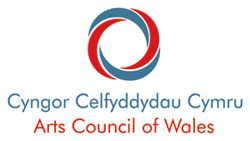
Arts Council of Wales supports this programme
02 Sep 14 | Draw the Line, Young Writers / Artists Programme, Youth Board
This month’s Draw The Line debate has shown itself to be a dilemma not easily answered in four weeks. Many of the responses we received have acknowledged that it is hardly a black and white topic but with conflicts flaring up all over the world it is an incredible important question to consider. As Usamah Mohamad writes on Twitter, “I think it is justified on a case by case” and therefore will not be answerable in umbrella terms. But can some countries prevent the media from full access based on it being a risk to security? Can conflict be a genuine excuse for censorship and the restriction of free expression?
An article written by Pat O’Mahony pitches in on the argument that the mainstream media has often its own agenda in maintaining “taste and decency”. He uses the example of Kenneth Jarecke’s renowned and “harrowing” picture which is an image which truly shows the reality of the Gulf War. Interestingly, he delved into the idea of self-censorship which involves us changing the channel, scrolling away or turning off the information entirely because even if the mainstream media does show the clips, it might be too much for us. O’Mahony describes this as a “remote control moment”. His analysis is well worth a read and he leaves us with a further unanswerable question: “In this social media era [where distressing images are a click away] should television news and newspaper editors still try to protect us from its full horrors?”
Even if we do not want to consume the media, however, shouldn’t journalists have the freedom to watch without prosecution? Such as with the criminalisation of the video of James Foley’s beheading there have been outcries of the Met police censoring journalists. An article by Index’s own Jodie Ginsberg has examined the “deeply problematic” removal of such media, especially when journalists themselves are banned from viewing the material. She argues that the Metropolitan Police cannot expect journalists to be able to report fully on an item without viewing it themselves. It’s a disturbing part of the job but it is vitally important.
Many have argued on Twitter that imposing censorship in times of war – particularly with the restriction of the internet (as seen in Ferguson and Turkey) and media access – will allow the government to continue censoring in the public interest even once the conflict has ended. As with the use of martial law to keep the peace throughout history it is often a tool of the state to restrict civilians from protesting about their treatment. Even in times of war there must be space for the provision of human rights and freedom to protest. Sheema Ghani offered the point that clamping down on critical civilians and journalists by using war as an excuse for censorship is just as good of a solution as sticking your head in the sand.
Overall, there is an understanding that some information – particularly in tenuous situations – must be kept private from citizens for the sake of state security. But with the introduction of social media and the ability for civilians to become journalists with Twitter accounts, the truth is trickling out of these conflicts despite the best efforts of their initiators. Violations are no longer kept secret as long as the Wifi connection holds up and this is a great leap forward for free expression.
This article was posted on 2 Sept 2014 at indexoncensorship.org
01 Sep 14 | Bahrain, Middle East and North Africa, News and features
UPDATE 4 September 17:22: Maryam Alkhawaja has a court date scheduled for 9am on Saturday 6 September, according to Travis Brimhall, head of the international office at the Bahrain Center for Human Rights.
Prominent human rights activist Maryam Alkhawaja has been jailed in Bahrain. She was detained at Bahrain International Airport on Friday as she tried to enter the country, and has yet to meet with her lawyer.
Alkhawaja, a dual Danish-Bahraini citizen, had her Danish passport confiscated and was told she no longer held Bahraini citizenship. She was also barred from using her phone or contacting her family, according to the Gulf Centre for Human Rights (GCHR), the organisation of which she is co-director. GCHR also reported that she was interrogated on charges of assaulting and injuring police officers, while lawyer Mohamed Al Jishi said he was not allowed to speak to his client before she was questioned. She is currently held in Isa Town women’s prison.
Alkhawaja was travelling to see her imprisoned father, who last week started a hunger strike. Abdulhadi Alkhawaja is a Bahraini human rights campaigner who co-founded the Bahrain Centre for Human Rights (BCHR), which won the 2012 Index Freedom of Expression Award for Advocacy. He was sentenced to life in prison on terrorism charges following pro-democracy protests that swept the country in 2011. Abdulhadi and his daughters Maryam and Zainab are outspoken critics of human rights violations in the constitutional monarchy, which is categorised as “not free” by Freedom House.
The case first gained attention after Alkhawaja tweeted about being detained on Friday, and an unnamed person close to the family continues to provide updates through her Twitter account. On Saturday, the account reported that she is also facing charges of insulting the king of Bahrain and over an anti-impunity campaign she was involved with in November 2013.
Human Rights Watch called the arrest “outrageous”, while GCHR has labelled the charges “fabricated” and has called on the international community to put pressure on Bahraini authorities to release father and daughter. The Danish Ministry of Foreign Affairs is sending a representative to Bahrain to provide support. Foreign Minister Martin Lidegaard tweeted on Sunday that a “solution must be found in Al-Khawaja case” and that he has raised the issue with the European Union.
This comes as the Supreme Court of Appeal in Bahrain on Sunday upheld a 10-year sentence on photographer Ahmad Humaidan. He was convicted over an attack on a police station in 2012, but human rights groups believe the case against him is connected to his coverage of pro-democracy demonstrations.
This article was posted on 1 Sept 2014 at indexoncensorship.org









 Is the space for artistic freedom of expression expanding or shrinking?
Is the space for artistic freedom of expression expanding or shrinking?

